We dance in the hallways.
He smells like I imagine nighttime
Adam might smell and I
smell like his hair and the skin close
to his armpit when we lie without moving
and he wears his unlaced shoes.
-Catherine Strisik, from “Before We Were Three/2007”
When Parkinson’s Enters a Marriage
Catherine Strisik’s collection of poems, The Mistress, is a masterful and intimate rendering of a marriage altered by Parkinson disease. It holds within its pages deep love and grief. It is sensuous and raw and, most of all, honest.
Catherine, a life-long writer and a care partner to her late husband Larry who had Parkinson disease, didn’t plan on pursuing fanfare or even further conversation on the book after it was published; she expected to release it into the world and let it take its own journey. But she has found that care partners who are intimately linked to loved ones with Parkinson’s keep calling her back, inviting her into conversation, seeking her words, and crying with gratitude in recognition: they feel seen by her poems.
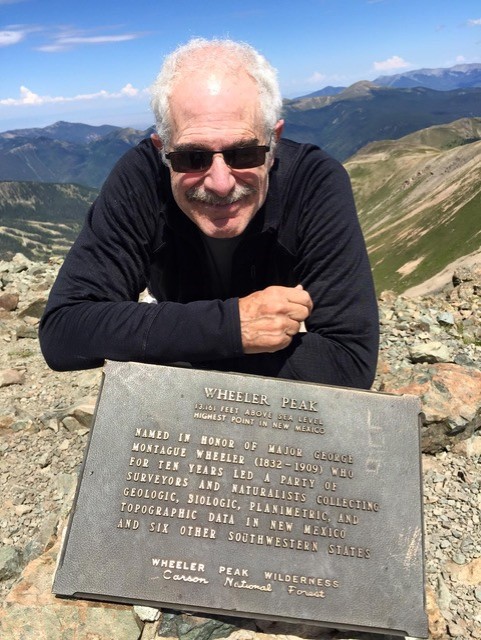
Catherine’s husband, Larry
Before They Were Three
Catherine met Larry, a physician and “big presence” in the Taos, NM community where they both lived, in a Spanish class over two decades ago. After catching her name on the check she was filling out to pay for class at the end of one session, he looked her up and found her number. When he asked her out, she was hesitant to say yes. He had a big personality, she told me, and a big family. In Larry’s first marriage, he and his first wife had three children together and then adopted ten children with special needs. “There was a lot happening in his home,” Catherine said, “and I was a lot quieter in my life.” But, as she summed up, she said yes to that first date, anyway, they fell in love, got married, and had a daughter of their own. “It was an incredible family,” she reflected. They traveled together and explored and gathered. “It was a big, big life with a lot of love and a lot of children.”
The Parkinson’s Mistress Appears
They were walking on the beach the first time she knew. They had come back East that summer to visit family in New England. “Larry was very proud,” she said, “as we are with our bodies…We were walking on the beach and I could see that his right arm wasn’t swinging and I kept thinking, ‘My god, how am I going to tell him this?’”
When she summoned the courage to say it aloud, she remembers their silence after she had spoken and then Larry dismissing it, telling her his rotator cuff had been bothering him. Only months later would Larry admit he knew, too. That summer, he had been noticing a slight twitch in his pinky finger. As a physician with patients who had Parkinson’s, he already guessed his diagnosis.
Pushing the Limits
To Larry, Catherine said, the Parkinson’s diagnosis was “devastating on every level,” and he entered a dark space. But after the initial shock, the darkness began to ease and Larry found himself more determined than ever. Before his diagnosis, Catherine says he “had become obsessed with summiting peaks.” He had climbed in Nepal twice and summited Mount Olympus in Greece. After learning of his PD, he wanted to continue chasing adventure and push himself physically. With a spirit of dauntlessness, he set a new goal: to climb Mount Kilimanjaro.
Four years after his diagnosis and with the help of amped up doses of levodopa, Catherine, Larry, and their daughter traveled to Tanzania where Larry, with support, would summit the ultimate peak.
Because of the altitude and lack of oxygen, Larry would experience many complications. But his fearlessness encouraged him to lean in and defy his diagnosis: he made it.
Reclaiming a Marriage
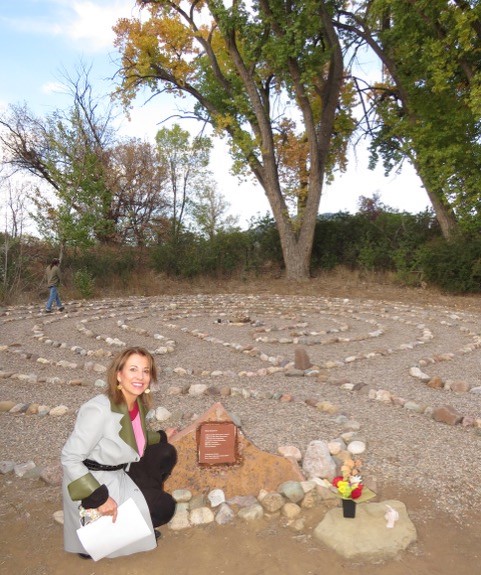
Catherine at her Taos Poet Laureate event
The effects of the climb lingered. After increasing his medication dosage to accomplish his goal, Larry quietly kept his dosage high for far too long because, as Catherine explained, “Who doesn’t want to feel like you’re 18 when you’re 60-something?” He started experiencing side effects. “He had energy and drive, but was like somebody out of control, a kind of mania.”
For Catherine, it was this strange experience of being near him but feeling like he was distant. She tried to bring him back home to himself. In a poem called “The Wife,” she describes her attempts:
Father’s Day. The grill is hot. The coals are red. A stranger appears–
says hello at the gate. In the physical form of husband. Come home.
For a minute. So. The wife sits on his lap, an unusual gesture for her
in front of others. She is trying to find him again.
Catherine recalls this moment: “I was attempting to make myself more familiar to him by sitting on his lap, which I wouldn’t typically do in front of a group of people.” She put her fingers in his hair, invited family over. “I was just trying to bring him back into who we were.”
Navigating The Waves: Good Days and Subtle Losses
One reason care partners in particular continue to find themselves in Catherine’s words is because she exposes not only Larry’s journey, but the experience of being an intimate partner to someone with Parkinson’s. She gives voice to the subtle losses, to the poignant contrast between before and after. “When your partner loses their sense of identity in the disease,” she told me, “you start to dwindle in many ways.” She recalls an unexpected loss: one of the first symptoms of Parkinson’s is often the loss of smell. In a poem to her husband, she remembers the moment she realized she was a “scentless woman to him.” She writes to him, “I want you / to say I remember.”
“All of the senses are sensuous,” Catherine told me, “but I thought when you can’t smell your lover’s scent anymore, it’s just one of the saddest moments.”
At the same time she felt herself slipping away from her identity, she also discovered an unknown side to her: “I realized how strong a human being I am.” Catherine knows both truths can exist at once: loss and strength, gratitude and pain.
There were good days. The days they went to support groups and exercise classes and Larry reclaimed his “big presence” in the community, where he remembered himself beyond his diagnosis as a man with a big heart who made everyone feel like a friend. “He would make people laugh and he would sing. He was just fun in those groups,” Catherine recalled.
Through it all, Larry also remained a committed father and big presence in his children’s lives. While the book often catalogues subtle losses and grief, there was beauty, too, both in her words and in their lives. There was love.
A Life Well-Worn
Today, Catherine hopes she can continue “rising up to help others through the book,” whether it’s partners, daughters, or sons of people with Parkinson’s. “It’s a true gift to be in this life as a poet,” she says. “And I have great appreciation for Larry”–for her book and for a life well-lived together.
Catherine realizes the blessing and power of being a writer: her words give language to a common feeling. When we recognize ourselves in words and suddenly have the language to name our experiences, there is this sense of relief and aha and comfort: we’re not alone.
Larry passed six years ago, but this book continues to touch lives and honor his legacy as a man who cared for and tended to his community. And Catherine continues to write. “I feel like, in many ways, I’ve had almost no control over this path in life. But it’s taught me to trust, every step of the way.”


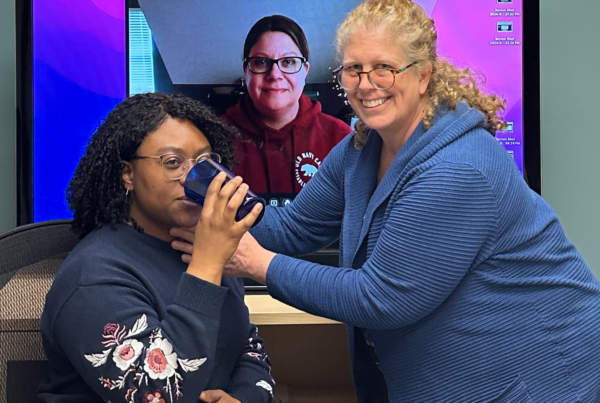
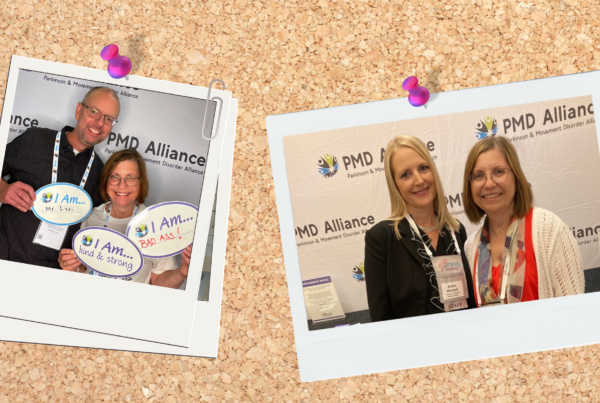
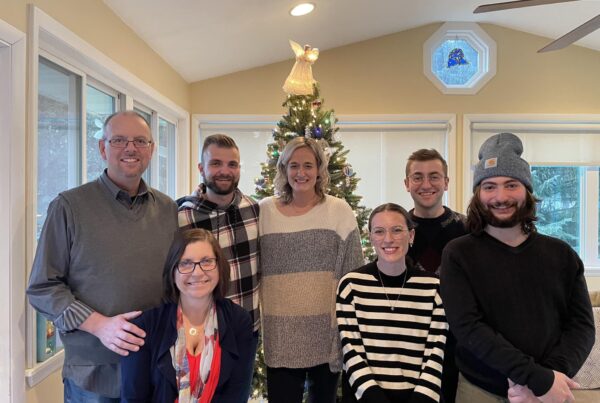


This was great, I have been researching for a while now, and I think this has helped. Have you ever come across Health Natural Centre Parkinson’s disease HERBAL FORMULA (just google it). It is a smashing one of a kind product for reversing Parkinson’s completely. Ive heard some decent things about it and my buddy got amazing success with itThis was great, I have been researching for a while now, and I think this has helped. Have you ever come across Health Natural Centre Parkinson’s disease HERBAL FORMULA (just google it). It is a smashing one of a kind product for reversing Parkinson’s completely. Ive heard some decent things about it and my buddy got amazing success with it.
I’m intrigued by the snippet of poetry presented here. Hope to find more by this poet elsewhere. I have PD but am as interested in caregivers’ perspectives as I am with those of people directly afflicted. Seeing the disease as a seducer and interloper is likewise intriguing, a good metaphor for the wileyness of the disease.
My husband has Parkinson’s disease, he is about 63 years old it was diagnosed 2 years ago. It was getting more difficult to live for him, because of stiff muscles he couldn’t even move. Mirapex and levodopa medicines were given, but didn’t give much relief. He couldn’t eat food without choking. I thought this might be the last stage and the medications he was given did not help at all, so I started to do alot of research on Ayurveda treatments, I was introduced to Health Natural Centre and their Parkinson’s Ayurveda Protocol. He started on the Ayurveda Treatment last year, his symptoms gradually diminished including his vocal cord spasm, Muscle Weakness, Tremors and Difficulty with swallowing. Reach them at natural herbs centre . c o m , he is getting active again since starting this treatment, he is able to walk again ( down the street and back ) he has also resumed exercising to strengthen muscles!! God Bless all PD Caregivers. Stay Strong, take small moments throughout the day to thank yourself, to love your self, and pray to whatever faith, star, spiritual force you believe in and ask for strength. I can personally vouch for these remedy but you would probably need to decide what works best for you.